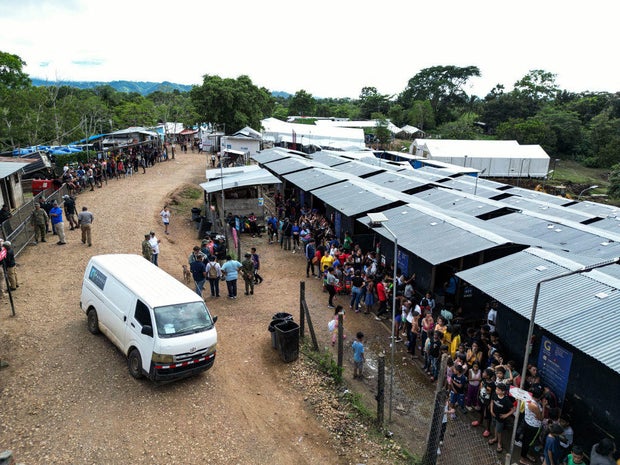[ad_1]
The U.S. and Panama signed an agreement on Monday that will allow American officials to help the Panamanian government deport migrants who cross the Darién Gap, a once-impenetrable jungle that has become a popular transit point for those traveling to the U.S. southern border.
Under the joint initiative, U.S. immigration officials will train and provide assistance to Panamanian authorities to help them carry out more deportations of migrants heading north. In recent years, Panama has reported record numbers of crossings along the roadless Darién jungle, including over half a million in 2023 alone.
The Department of Homeland Security will be dispatching officials who have experience screening asylum claims and deporting migrants to Panama so they can assist their Panamanian counterparts on the ground. Using State Department funds, the U.S. will also help Panama build up its deportation infrastructure.
Homeland Security Secretary Alejandro Mayorkas, who attended the inauguration of Panama’s President-elect José Raúl Mulino on Monday, said the agreement is part of “a regional response” to migration.
“As the United States continues to secure our borders and remove individuals without a legal basis to remain, we are grateful for our partnership with Panama to manage the historic levels of migration across the Western Hemisphere,” Mayorkas said in a statement.
MARTIN BERNETTI/AFP via Getty Images
Mulino has vowed to take a tough stance against migrant arrivals in Panama, pledging to “close” the Darién Gap and accusing international aid workers of facilitating illegal migration.
The arrangement between the two countries had been months in the making. CBS News first reported on the Biden administration’s plans to send U.S. immigration officials to Panama in November.
The move is the latest action taken by the Biden administration to stem illegal crossings at the U.S. southern border. Last month, following President Biden’s move to partially shut down asylum processing using his executive authority, unlawful border crossings fell to the lowest level recorded during his administration.
The agreement also underscores how much the U.S. — under Democratic and Republican administrations — has come to rely on other countries to reduce migrant crossings along its southern border.
Over the past few months, Mexican officials have conducted an aggressive operation to stop migrants from reaching northern Mexico. Ecuador also recently imposed visa requirements for Chinese migrants, who were using the South American country as a lily pad to get to the U.S. border.
[ad_2]
Source



